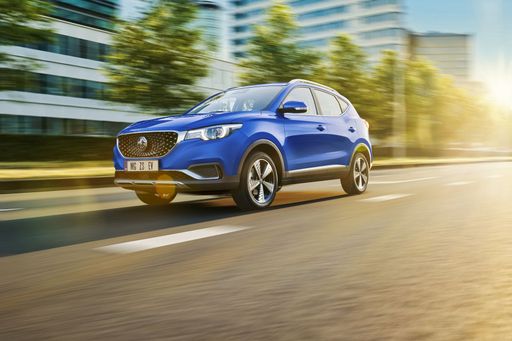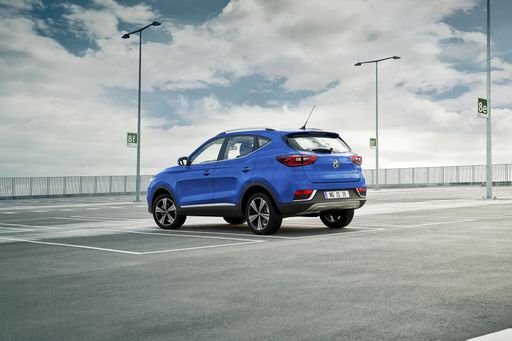MG ZS vs VW Tiguan - Differences and prices compared
Compare performance (197 HP vs 272 HP), boot space and price (18000 £ vs 33300 £ ) at a glance. Find out which car is the better choice for you – MG ZS or VW Tiguan?
Costs and Efficiency:
Price and efficiency are often the first things buyers look at. Here it becomes clear which model has the long-term edge – whether at the pump, the plug, or in purchase price.
MG ZS has a clearly advantage in terms of price – it starts at 18000 £ , while the VW Tiguan costs 33300 £ . That’s a price difference of around 15309 £.
Fuel consumption also shows a difference: VW Tiguan manages with 1.40 L and is therefore significantly more efficient than the MG ZS with 5 L. The difference is about 3.60 L per 100 km.
Engine and Performance:
Power, torque and acceleration are the classic benchmarks for car enthusiasts – and here, some clear differences start to show.
When it comes to engine power, the VW Tiguan has a evident edge – offering 272 HP compared to 197 HP. That’s roughly 75 HP more horsepower.
In acceleration from 0 to 100 km/h, the VW Tiguan is decisively quicker – completing the sprint in 5.90 s, while the MG ZS takes 8.70 s. That’s about 2.80 s faster.
In terms of top speed, the VW Tiguan performs clearly perceptible better – reaching 242 km/h, while the MG ZS tops out at 179 km/h. The difference is around 63 km/h.
There’s also a difference in torque: VW Tiguan pulls convincingly stronger with 400 Nm compared to 148 Nm. That’s about 252 Nm difference.
Space and Everyday Use:
Whether family car or daily driver – which one offers more room, flexibility and comfort?
Both vehicles offer seating for 5 people.
In curb weight, MG ZS is clearly perceptible lighter – 1330 kg compared to 1599 kg. The difference is around 269 kg.
In terms of boot space, the VW Tiguan offers noticeable more room – 652 L compared to 443 L. That’s a difference of about 209 L.
In maximum load capacity, the VW Tiguan performs to a small extent better – up to 1650 L, which is about 193 L more than the MG ZS.
When it comes to payload, VW Tiguan somewhat takes the win – 533 kg compared to 470 kg. That’s a difference of about 63 kg.
Who wins the race in the data check?
The VW Tiguan is far ahead overall in the objective data comparison.
This result only shows which model scores more points on paper – not which of the two cars feels right for you.
Costs and Consumption
View detailed analysis
Engine and Performance
View detailed analysis
Dimensions and Body
View detailed analysis

VW Tiguan
MG ZS
The MG ZS arrives as a cheeky and practical choice for shoppers who want SUV style and family-friendly space without blowing the budget. It may not pretend to be premium, but with sensible equipment, easy-to-live-with driving manners and surprising value, it makes a persuasive case for anyone after sensible transport with a bit of personality.
details




VW Tiguan
The VW Tiguan blends sensible family practicality with a dash of German polish, delivering a calm, reassuring ride and a cabin that never feels like an afterthought. For buyers who want an SUV that’s easy to live with yet still nicely dressed, the Tiguan is the grown‑up choice that keeps a cheeky wink in reserve.
details





Costs and Consumption |
|
|---|---|
|
Price
18000 - 24000 £
|
Price
33300 - 51900 £
|
|
Consumption L/100km
5 - 6.5 L
|
Consumption L/100km
1.4 - 8.4 L
|
|
Consumption kWh/100km
-
|
Consumption kWh/100km
-
|
|
Electric Range
-
|
Electric Range
118 - 126 km
|
|
Battery Capacity
-
|
Battery Capacity
19.70 kWh
|
|
co2
113 - 145 g/km
|
co2
32 - 190 g/km
|
|
Fuel tank capacity
41 - 55 L
|
Fuel tank capacity
45 - 58 L
|
Dimensions and Body |
|
|---|---|
|
Body Type
SUV
|
Body Type
SUV
|
|
Seats
5
|
Seats
5
|
|
Doors
5
|
Doors
5
|
|
Curb weight
1330 - 1420 kg
|
Curb weight
1599 - 1890 kg
|
|
Trunk capacity
443 L
|
Trunk capacity
490 - 652 L
|
|
Length
4430 mm
|
Length
4539 mm
|
|
Width
1818 mm
|
Width
1842 - 1859 mm
|
|
Height
1635 mm
|
Height
1656 - 1658 mm
|
|
Max trunk capacity
1457 L
|
Max trunk capacity
1486 - 1650 L
|
|
Payload
375 - 470 kg
|
Payload
460 - 533 kg
|
Engine and Performance |
|
|---|---|
|
Engine Type
Full Hybrid, Petrol
|
Engine Type
Petrol, Petrol MHEV, Diesel, Plugin Hybrid
|
|
Transmission
Automatic, Manuel
|
Transmission
Automatic
|
|
Transmission Detail
Automatic Gearbox, Manual Gearbox
|
Transmission Detail
Dual-Clutch Automatic
|
|
Drive Type
Front-Wheel Drive
|
Drive Type
All-Wheel Drive, Front-Wheel Drive
|
|
Power HP
116 - 197 HP
|
Power HP
130 - 272 HP
|
|
Acceleration 0-100km/h
8.7 - 12.5 s
|
Acceleration 0-100km/h
5.9 - 10.6 s
|
|
Max Speed
168 - 179 km/h
|
Max Speed
210 - 242 km/h
|
|
Torque
148 Nm
|
Torque
220 - 400 Nm
|
|
Number of Cylinders
4
|
Number of Cylinders
4
|
|
Power kW
85 - 145 kW
|
Power kW
96 - 200 kW
|
|
Engine capacity
1495 - 1498 cm3
|
Engine capacity
1498 - 1984 cm3
|
General |
|
|---|---|
|
Model Year
2024 - 2025
|
Model Year
2024 - 2025
|
|
CO2 Efficiency Class
C, E
|
CO2 Efficiency Class
G, D, E, F, B
|
|
Brand
MG
|
Brand
VW
|
What drive types are available for the MG ZS?
The MG ZS is available as Front-Wheel Drive.




